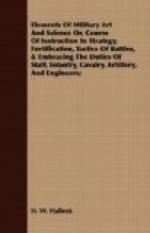2d. When reinforcements are about to join you, and this can only be effected by a march through a country actually occupied by hostile corps, or liable to be so occupied, you must again waive the general rule, and risk one party for the security of the other; or, (which may be better,) make such movements with your main body as shall accomplish your object.
3d. When you have complete evidence of the actual, or probable insurrection in your favor, of a town or province of your enemy, or of a division of his army, you must support this inclination by strong detachments, or by movements of your main body. Napoleon’s operations in Italy, in 1796-7, furnish examples of what is here meant.
4th. When, by dispatching a detachment, you may be able to intercept a convoy, or reinforcement, coming to the aid of your enemy.
These are apparent rather than real exceptions to the rule of concentration. This rule does not require that all the army should occupy the same position. Far from it. Concentration requires the main body to be in immediate and supporting reach: small detachments, for temporary and important objects, like those mentioned, are perfectly legitimate, and in accordance with correct principles. Napoleon’s position in Spain will serve as an illustration. A hand, placed on the map of that country, will represent the position of the invading forces. When opened, the fingers will represent the several detachments, thrown out on important strategic lines, and which could readily be drawn in, as in closing the hand, upon the principal and central mass, preparatory to striking some important blow.
“If, as we have seen, it be the first great rule for an army acting on the offensive principle, to keep its forces concentrated, it is, no doubt, the second, to keep them fully employed. Is it your intention to seize a particular province of your enemy? to penetrate to his capital? or to cut him off from his supplies? Whatever measure be necessary to open your route to these objects must be promptly taken; and if you mean to subsist yourself at his expense, your movements must be more rapid than his. Give him time to breathe,—and above all, give him time to rest, and your project is blasted; his forages will be completed, and his magazines filled and secured. The roads of approach will be obstructed, bridges destroyed, and strong points everywhere taken and defended. You will, in fact, like Burgoyne, in 1777, reduce yourself to the necessity of bleeding at every step, without equivalent or use.”
“Such cannot be the fate of a commander who, knowing all the value of acting on the offensive, shakes, by the vigor and address of his first movements, the moral as well as physical force of his enemy,—who, selecting his own time, and place, and mode of attack, confounds his antagonist by enterprises equally hardy and unexpected,—and who at last leaves to him only the alternative of resistance without hope, or of flying without resistance.”




